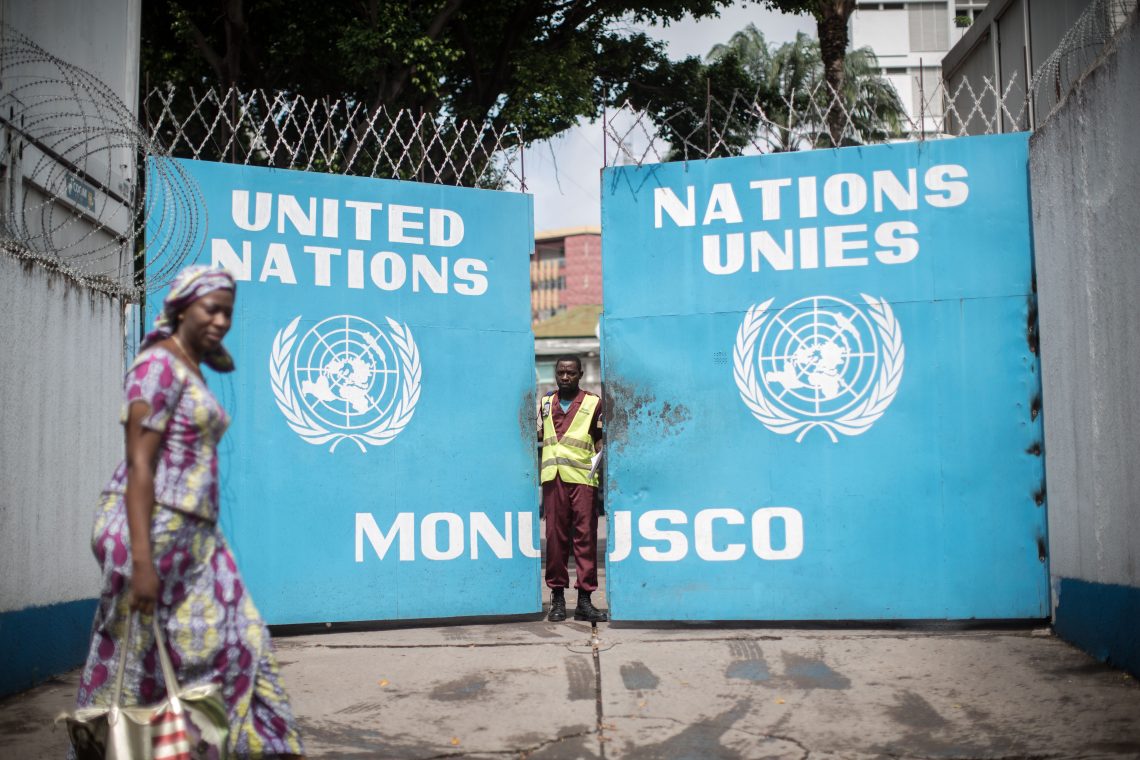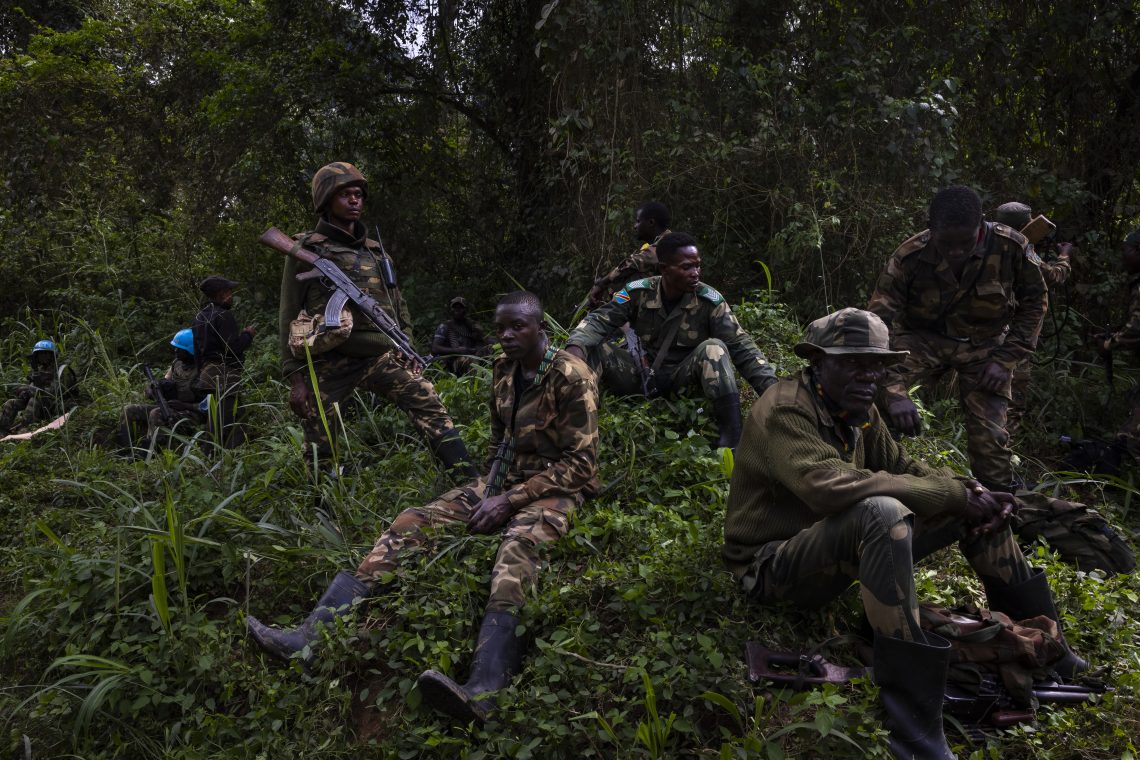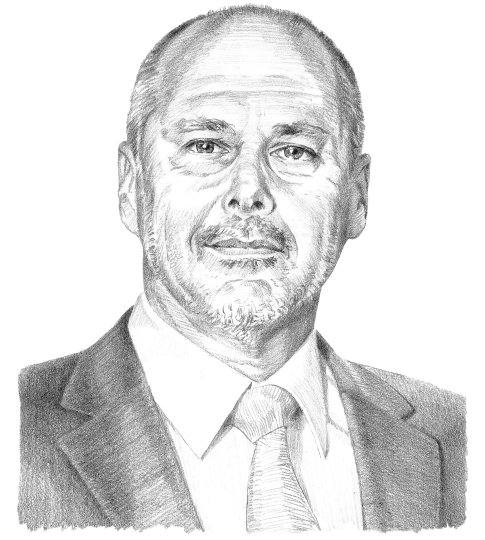The future of MONUSCO
The United Nations mission in the Democratic Republic of the Congo faces operational challenges amid ongoing instability, in addition to struggling with allegations of misconduct.

In a nutshell
- UN forces face multifaceted difficulties in the DRC
- The government has called for a prompt withdrawal of peacekeepers
- If discontinued, the mission could leave behind a power vacuum
After the First Congo War (1996-1997), self-proclaimed President Laurent-Desire Kabila failed to live up to the expectations of the people and neighboring states. Various rebel groups plunged the Democratic Republic of Congo (DRC) into a new crisis that quickly escalated into the Second Congo War (1998-2003).
Several of these insurgent groups, which received considerable support from foreign states, tried to unseat the government for different reasons. The interests at stake were not only politically motivated. For example, North Korea intervened and received uranium for its nuclear program in return, and Israel demanded a third of Congolese diamond production for its help.
President Kabila was shot dead in his office in Kinshasa on January 16, 2001. His son, Joseph Kabila, who was chief of the general staff at the time, was appointed president by his father’s inner circle, without elections. The change in leadership allowed negotiations with the rebels to take place.
Despite the Peace of Pretoria on June 30, 2003, occasional violence continues to this day. Often, local battles, such as the Kivu War (2006-2009), flare up significantly.
UN forces in the DRC
On November 30, 1999, the UN Security Council passed Resolution 1279, which transferred previous resolutions to the mandate of MONUC (Mission de l’Organisation des Nations Unies en Republique Democratique du Congo). Among other things, this authorized 500 military observers to monitor the cease-fire, ensured liaison among the opposing groups, installed a demining program and sought to protect the most vulnerable segments of the population.
Already on February 24, 2001, the mandate was adapted and strengthened. Some 5,500 blue helmets were now to exercise tighter control over the warring parties, disarm mobilized groups and keep communication routes open. In 2003, MONUC was supported by the EUFOR operation “ARTEMIS.”
In principle, blue helmets try to stay out of warlike activities and to ensure de-escalation among the conflict parties. However, MONUC members repeatedly came under fire from various rebel groups, prompting the UN Security Council to grant MONUC a robust mandate under Chapter VII of the UN Charter. MONUC soldiers were thus legitimized to enforce peace between opposing parties by force of arms or to conduct offensive operations for their own protection.
Various resolutions increased troop levels to a considerable 22,000 by 2017, but they were reduced again to around 16,700 in 2018, primarily for financial reasons.
Operational challenges
Various incidents hindered the mandate of MONUC, renamed MONUSCO (Mission de l’Organisation des Nations Unies pour la Stabilisation en Republique Democratique du Congo) on June 30, 2010. Violent events included the capture of the Kivu region and the megacity of Goma by the rebel group M23 in November 2012, when neither the regular Congolese army nor UN troops could oppose General Bosco Ntaganda, who is wanted as a war criminal.
The advance of the M23 triggered a mass exodus but also demonstrated the ineffectiveness of the security forces, prompting the UN to issue an offensive mandate for the first time in its peacekeeping history (Resolution 2089). A Force Intervention Brigade, consisting of over 3,000 soldiers and equipped with mechanized weapons systems, supported by two combat helicopter units provided by Ukraine and South Africa, was created to fight rebel groups.
However, maintaining control in such a vast and geographically challenging region is difficult. The area, characterized by dense jungle, limited road accessibility, bridges with restricted load-bearing capacity, mountainous borders and complex supply routes, presents formidable obstacles. In most cases, MONUSCO’s blue-helmet troops have reacted rather than acted.

A few safe harbors were formed throughout the Congo, especially in the east. There, the most vulnerable people, especially women and children, were somewhat protected from violent attacks. In addition, rebels’ freedom of movement, at least on the main axes and with heavy equipment, was massively curtailed.
Investments in nation building have also produced results. The police, military, courts, civil administration, prisons and other institutions have been supported on various occasions by members of the UN mission, with the aim of preserving peace and human rights.
In addition, mobility within Congo has been improved by significantly enhancing aviation security. Regional airports have been equipped with air traffic control systems that allow safe navigation and correct approach to the airport.
Policy issues
Considerable challenges remain. Many members of the UN troops of MONUSCO come from countries that are themselves struggling with nation building and the rule of law. Serving in a UN mission such as MONUSCO is extremely lucrative financially for members of most African, Latin American and Asian states.
In personal conversations, I have learned that for many of these soldiers, the “per diem” that the UN pays out in the field is much higher than domestic salaries. Most service members choose to live in modest conditions to save money. They are often eager to prolong their deployment and are willing to sacrifice a portion of their salary for this opportunity. As a Swiss general on the ground, I was responsible for ensuring that extensions of deployment were granted solely based on performance. However, it is common for agencies or services in the home countries of these UN soldiers and police officers to approve these deployments or extensions if they receive a share of the financial benefits.
Another issue is that MONUSCO is a mostly French-speaking mission. Most participants from Northern Europe, various Arab countries, Turkey, Ukraine, Russia or Asian countries do not speak French. While English has established itself as a second mission language, this again creates a barrier in communicating with local authorities and with the population.
More by Beat Eberle
Switzerland’s eroded defense capabilities
Seeking the supposed peace dividend after the Cold War, the Swiss dismantled critical parts of their unique national defense system. Restoring it is proving difficult.
The level of training of a large proportion of the staff makes it difficult to carry out demanding missions in a professional manner. The UNOPOL camp in Kinshasa, for example, was guarded by a Bangladeshi women’s unit. Since most of the women were Muslim, they were not allowed to speak with the men they were charged with protecting and were not at all capable, training-wise, of participating in an armed conflict. Whenever the camp was fired upon, there was no reaction, not even the most minimal protective measures. As a rule, it took the strict orders of the members of the gendarmerie from France and African countries to even begin to ensure the protection of the camp.
This is one of the excesses of UN policy, which wants to increase the proportion of women at all costs. There is often more emphasis on the diversity of the force than on the proficiency of soldiers and police officers in their field duties.
In some key areas, individuals are often assigned to missions not based on their competence or fit for the role, but rather as a gesture of goodwill toward a deserving colleague nearing the end of their career. This approach, especially prevalent in the selection process of the sending country, does not always prioritize quality or suitability. Such a practice can be particularly detrimental at higher ranks, as it may not provide the most qualified individuals for crucial roles.
In addition, there is the financial gap between the UN staff and large parts of the local population, who must use every opportunity to generate the necessary means for survival. Many young locals try to earn a living by doing favors of any kind. Incidents involving sexual exploitation and abuse occur time and again. In most cases, these are sexual favors provided in exchange for payment. In rare cases, there are instances of sexual violence.
It is important to acknowledge that while there are instances of misconduct, these are relatively rare. However, such incidents often receive widespread attention in global media. Numerous instances where UN soldiers and police officers have saved civilian lives, often at great personal risk, tend to receive less media coverage. Acts of heroism among UN personnel are more common than misdeeds, but they are not as prominently reported.
Considering the UN’s role in effectively limiting the activities of both rebel factions and state entities, it is obvious that some actors would have a clear interest in undermining the UN mission. Regrettably, there are vulnerabilities that can be exploited to this end.
Consequently, the DRC government has expressed a desire to end MONUSCO’s mandate in a timely manner. However, this is likely to be damaging to security and stability in the country. It is questionable whether the international community, which is interested in stability because of the important supplies of natural resources from the conflict area, will be willing to accept this. The process of nation building is under way, but it is far from complete.
Scenarios
Less likely scenario: The UN mandate for MONUSCO is extended
Under this scenario, there is little hope that the quality of the mandate will improve significantly. The status quo generates a certain degree of stability and security, as well as small but continuous progress in state organs such as the police, army, courts and prisons.
International players, whether state-owned or private, can rely on no power vacuum being created, rebel groups are kept at a distance to some extent and investments are made to improve working conditions due to supply chain regulations.
More likely scenario: MONUSCO’s UN mandate is not extended
Whether the DRC’s security and police forces will be able to fill this vacuum is an open question, but it is rather unlikely. There is a risk that non-state or quasi-state actors will be given more room to maneuver and will use it. Moreover, it is also conceivable that foreign state actors will gain influence in the eastern DRC and become interested in exploiting the mineral resources there.
In particular, Western companies are likely to find it more difficult to survive in this environment due to the regulatory regimes in their domiciliary countries. It is likely that players from regions with fewer scruples will influence the exploitation of mineral resources. Moreover, it is also conceivable that neighboring states to the east will directly influence events in the Kivu region, causing additional instability.
Already, various special forces from states that want to directly influence the path of sensitive resources from Congo are operating covertly. In a more unstable environment, this out-of-state, uncontrollable influence is likely to increase.
For industry-specific scenarios and bespoke geopolitical intelligence, contact us and we will provide you with more information about our advisory services.









